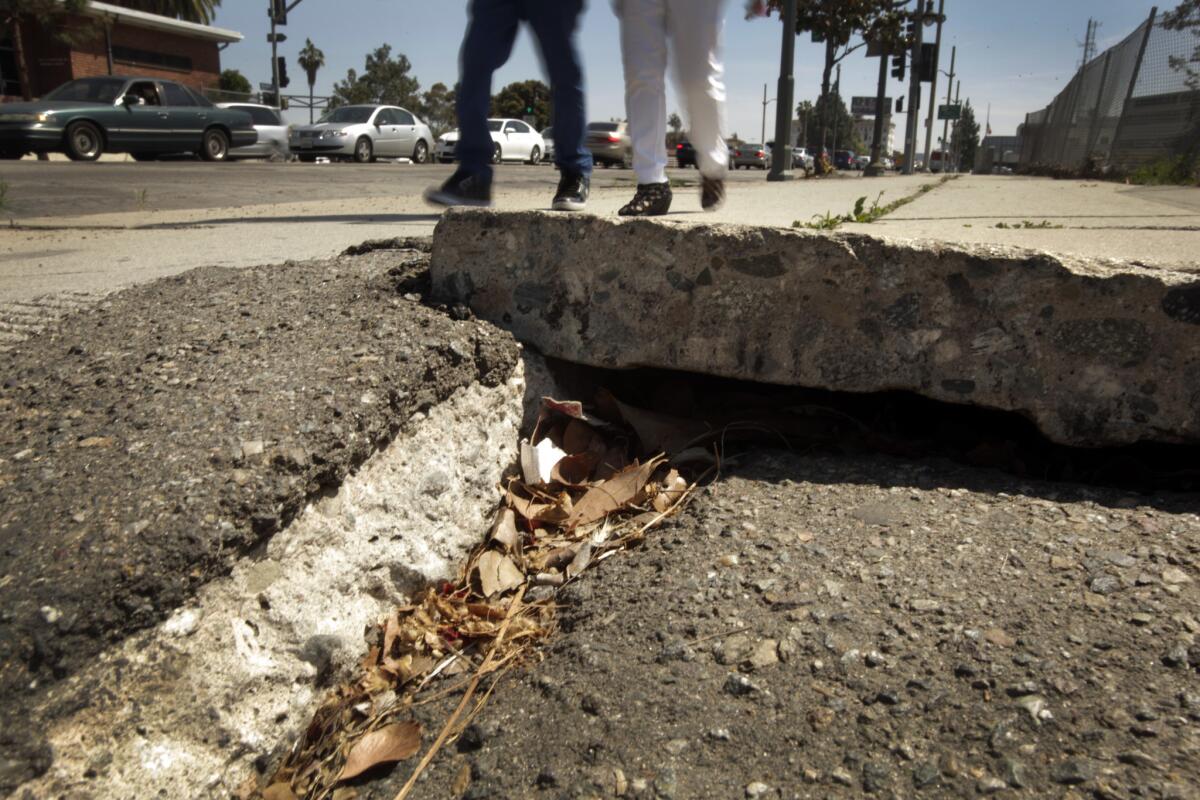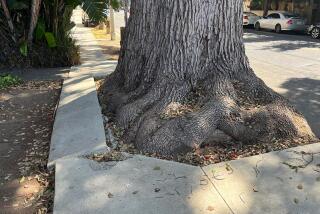L.A. could fund sidewalk repairs in front of businesses

Two people navigate a buckled sidewalk along Vermont Avenue at the 101 Freeway.
Los Angeles lawmakers tentatively backed the idea Monday of ponying up money to fix broken sidewalks in both residential and commercial areas, in a first step toward setting out a road map for smoothing out city walkways for years to come.
City Council members are trying to hash out a policy as Los Angeles starts to invest tens of millions of dollars annually in its sidewalks: Under a pending settlement with attorneys for the disabled, the city has pledged to spend $1.4 billion over the next three decades to fix its massive backlog of buckled walkways.
At a Monday hearing held jointly by two City Council committees, Councilman Paul Krekorian proposed that the city should help pay for repairs in both residential and commercial areas.
City officials had previously suggested L.A. would pay to fix sidewalks next to homes but leave it up to businesses, churches and other “commercial” properties to fund repairs on their adjacent walkways -- partly because such sidewalks can be more costly to repair.
Under the earlier plan, the city would inspect sidewalks in commercial areas and warn owners if they needed to be fixed. If they failed to do so after a year, the city would fix the sidewalks, charge the costs to the owners and fine them.
Instead, Krekorian proposed that the city would fund repairs the same way for all to create a “seamless” system for ensuring L.A. sidewalks are smooth and accessible and to prevent churches and nonprofits from being hit with sudden expenses.
However, the councilman added that the city should curb the amount it reimburses property owners, possibly by capping the maximum amount it would shell out per square foot. For instance, if a massive office building had a wide sidewalk that required “complicated repairs,” Krekorian said, “the city should not be on the hook for the entire amount.”
Members of the two committees – one focused on the budget, the other on public works – agreed with that idea. City staffers are supposed to come back with more detailed reports on how it would work, including how much the city would pay and what incentives the city could offer to encourage property owners to start fixing buckled walkways.
Lawmakers still have to answer a host of other questions about how L.A. will handle sidewalk repairs, including the controversial matter of whether the city will hand over responsibility for future repairs to homeowners and businesses after it fixes up their sidewalks. That idea, dubbed “fix and release,”was recommended by City Administrative Officer Miguel Santana.
Santana and other officials say that Los Angeles ended up with broken walkways partly because of an unusual city rule that has been in place for more than four decades: State law puts the burden for sidewalk repairs on the adjacent businesses or homeowners, but L.A. took on responsibility for walkways buckled by street trees in the 1970s after getting federal funding to fix them. When that money dried up, L.A. didn’t keep up with the needed repairs.
Santana argued that rolling back that rule and gradually handing off responsibility for repairing sidewalks that were ruptured by street trees would help ensure that sidewalks never return to the sorry state that landed L.A. in court.
But the idea has spurred opposition from some homeowners who argue it would put too much of a burden on residents, as well as nonprofits and advocacy groups who say that the city should fund and maintain sidewalks the same way as roads.
At the Monday hearing, South Los Angeles resident Angelina Jimenez told lawmakers that the sidewalk should be seen as city property, not that of homeowners like her and her husband.
“The property owners already pay their taxes,” she told council members.
Councilman Mitch Englander said he had serious concerns about the idea, as did several other lawmakers who said they wanted to hammer out more details about fixing sidewalks before deciding whether to change city policy about who bore responsibility for future repairs. The two committees plan to continue discussing the issue at their next joint meeting.
Follow @latimesemily for what’s happening at Los Angeles City Hall
ALSO
As huge El Niño brews, California fights to keep drought mentality
Oakland police fatally shoot man who allegedly pointed replica gun
Man killed when struck in the face by homemade rocket at Scouting event
More to Read
Sign up for Essential California
The most important California stories and recommendations in your inbox every morning.
You may occasionally receive promotional content from the Los Angeles Times.











